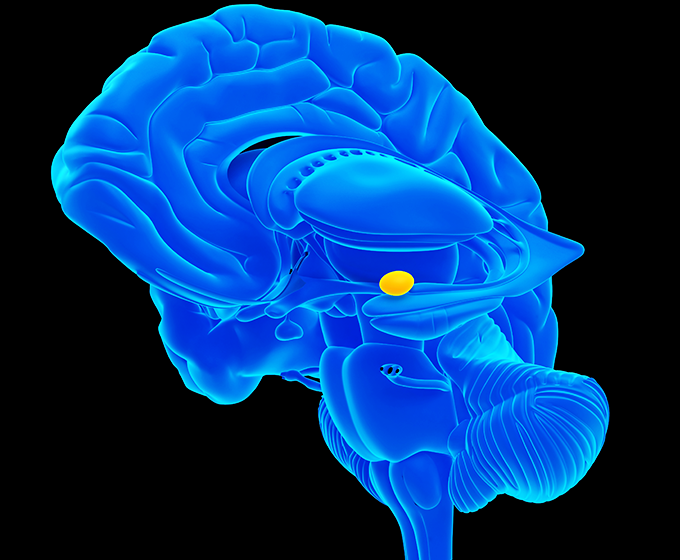
A rendering of the human brain highlighting the amygdala.
Nov. 12, 2019 — UTSA researchers are pioneering an innovative brain study that sheds light on how the amygdala portion of the brain functions and could contribute to a better understanding of post-traumatic stress disorder, anxiety, depression and Alzheimer’s disease.
The researchers, Alfonso Apicella, an associate professor in the Department of Biology, research associate Alice Bertero, postdoctoral fellow Paul Luc Caroline Feyen, and graduate student Hector Zurita, published their study, “A non-canonical cortico-amygdala inhibitory loop,” in The Journal of Neuroscience, the flagship journal of the Society for Neuroscience. Their research was also featured on the Oct. 23 cover of the journal.
Conditions such as PTSD, anxiety and depression are thought to be linked to the abnormal functioning of the amygdala, which is located within the temporal lobes and plays a key role in processing emotions, actions and cognition.
“This novel research paper provides anatomical and physiological evidence for the existence of a long-range inhibitory pathway from the auditory cortex to the amygdala in the mouse brain,” Apicella said. “For the first time, in our paper we show this emotional pathway.”
Apicella explained that advances in the techniques for labeling individual neuronal cells made it possible to study the individual neurons extending from the auditory cortex to the amygdala.
He added that the inhibitory cortical neurons can alter the activity of the amygdala’s principal neurons and can therefore directly control the output of the amygdala. The neurons contain a substance called somatostatin, and it regulates physiological functions and forms a connection with principal neurons that project to other brain regions outside the amygdala that are involved in fear and aversive behavior.
“The discovery that the amygdala receives both excitatory and inhibitory inputs from that cortex suggests that the timing and relative strength of these inputs can affect the activity of the amygdala,” Acipella said.
Apicella and his research team noted that future experiments should examine whether this is a general mechanism by which sensory stimuli can influence the processes controlled by the amygdala, such as fear/aversive behavior and how the disruption of this pathway can lead to several neurological and psychiatric disorders, such as,Alzheimer’s, anxiety, depression and PTSD.
Research related to this topic will continue in Apicella’s lab. His research group investigates the neural basis of perception. More specifically, the researchers want to understand how cortical microcircuits process sensory information leading to behavioral outcomes.
Apicella is also part of UTSA’s Neurosciences Institute and Brain Health Consortium, a collaborative, multidisciplinary team committed to discovering the inner workings of the brain.
Learn more about Alfonso Apicella’s Lab at UTSA.
Celebrate UTSA’s 50th Anniversary and share social media posts about the 50th using the hashtag #UTSA50.
Connect with UTSA online at Facebook, Twitter, YouTube, Instagram and LinkedIn.
UTSA Today is produced by University Communications and Marketing, the official news source of The University of Texas at San Antonio. Send your feedback to news@utsa.edu. Keep up-to-date on UTSA news by visiting UTSA Today. Connect with UTSA online at Facebook, Twitter, Youtube and Instagram.
Move In To COLFA is strongly recommended for new students in COLFA. It gives you the chance to learn about the Student Success Center, campus resources and meet new friends!
Academic Classroom: Lecture Hall (MH 2.01.10,) McKinney Humanities BldgWe invite you to join us for Birds Up! Downtown, an exciting welcome back event designed to connect students with the different departments at the Downtown Campus. Students will have the opportunity to learn about some of the departments on campus, gain access to different resources, and collect some giveaways!
Bill Miller PlazaCome and celebrate this year's homecoming at the Downtown Campus with food, games, giveaways, music, and more. We look forward to seeing your Roadrunner Spirit!
Bill Miller PlazaThe University of Texas at San Antonio is dedicated to the advancement of knowledge through research and discovery, teaching and learning, community engagement and public service. As an institution of access and excellence, UTSA embraces multicultural traditions and serves as a center for intellectual and creative resources as well as a catalyst for socioeconomic development and the commercialization of intellectual property - for Texas, the nation and the world.
To be a premier public research university, providing access to educational excellence and preparing citizen leaders for the global environment.
We encourage an environment of dialogue and discovery, where integrity, excellence, respect, collaboration and innovation are fostered.